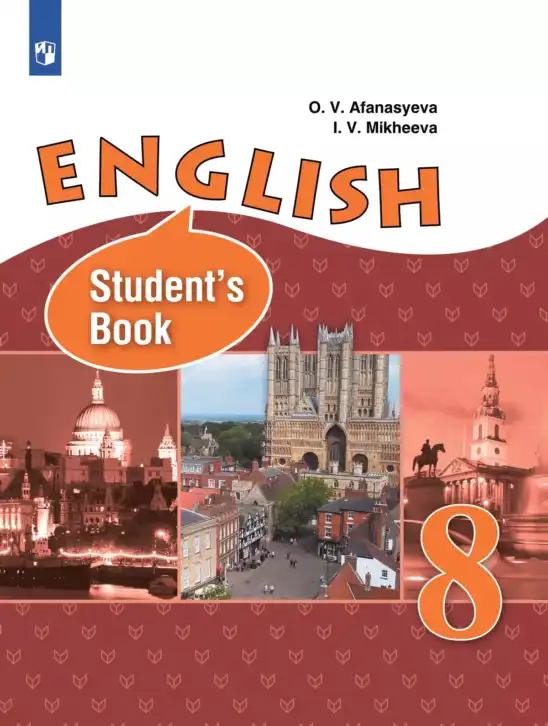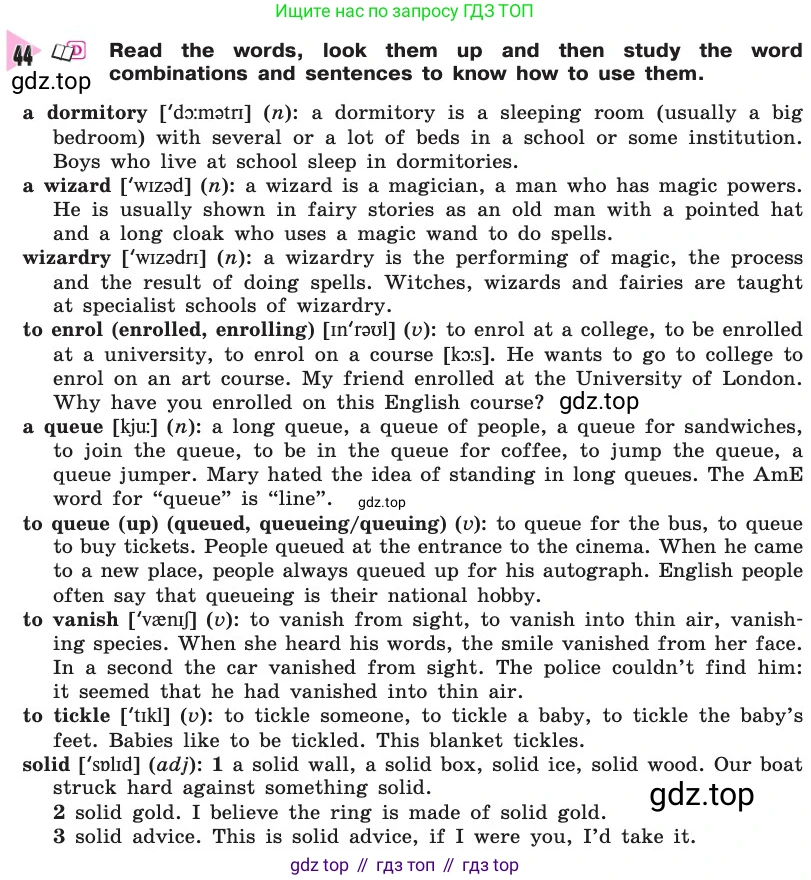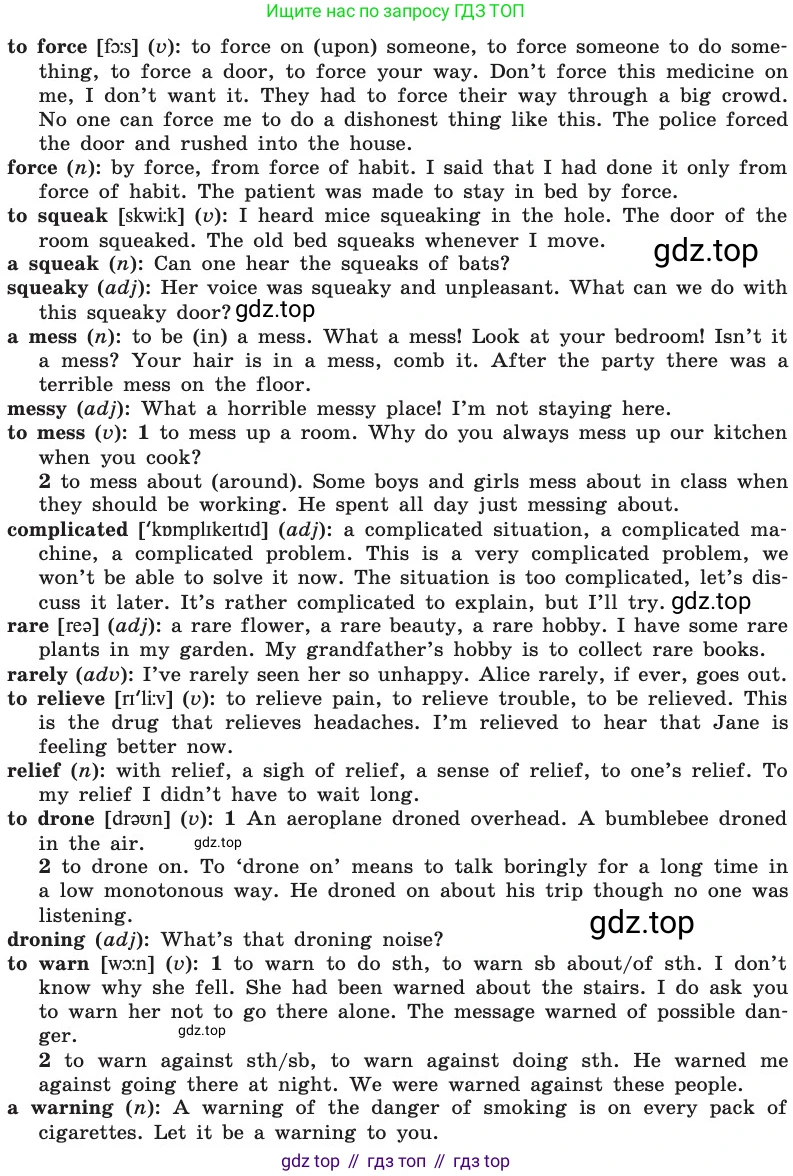Номер 44, страница 64 - гдз по английскому языку 8 класс учебник Афанасьева, Михеева

Авторы: Афанасьева О. В., Михеева И. В.
Тип: Учебник
Издательство: Просвещение
Год издания: 2014 - 2025
Уровень обучения: углублённый
Цвет обложки: белый
ISBN: 978-5-09-034201-8
Допущено Министерством просвещения Российской Федерации
Популярные ГДЗ в 8 классе
Unit 2. Education: The World of Learning. New Language. Vocabulary Section - номер 44, страница 64.
№44 (с. 64)
Условие. №44 (с. 64)
скриншот условия


44 Read the words, look them up and then study the word combinations and sentences to know how to use them.
a dormitory ['dɔ:mətəri] (n): a dormitory is a sleeping room (usually a big bedroom) with several or a lot of beds in a school or some institution. Boys who live at school sleep in dormitories.
a wizard ['wɪzəd] (n): a wizard is a magician, a man who has magic powers. He is usually shown in fairy stories as an old man with a pointed hat and a long cloak who uses a magic wand to do spells.
wizardry ['wɪzədri] (n): wizardry is the performing of magic, the process and the result of doing spells. Witches, wizards and fairies are taught at specialist schools of wizardry.
to enrol (enrolled, enrolling) [ɪn'rəʊl] (v): to enrol at a college, to be enrolled on a course [kɔ:s]. He wants to go to college to enrol on an art course. My friend enrolled at the University of London. Why have you enrolled on this English course?
a queue [kju:] (n): a long queue, a queue of people, a queue for sandwiches, to join the queue, to be in the queue for coffee, to jump the queue, a queue jumper. Mary hated the idea of standing in long queues. The AmE word for "queue" is "line".
to queue (up) (queued, queueing/queuing) (v): to queue for the bus, to queue to buy tickets. People queued at the entrance to the cinema. When he came to a new place, people always queued up for his autograph. English people often say that queueing is their national hobby.
to vanish ['vænɪʃ] (v): to vanish from sight, to vanish into thin air, vanish-ing species. When she heard his words, the smile vanished from her face. In a second the car vanished from sight. The police couldn't find him: it seemed that he had vanished into thin air.
to tickle ['tɪkl] (v): to tickle someone, to tickle a baby, to tickle the baby's feet. Babies like to be tickled. This blanket tickles.
solid ['sɒlɪd] (adj):
1 a solid wall, a solid box, solid ice, solid wood. Our boat struck hard against something solid.
2 solid gold. I believe the ring is made of solid gold.
3 solid advice. This is solid advice, if I were you, I'd take it.
to force [fɔ:s] (v): to force on (upon) someone, to force someone to do some-thing, to force a door, to force your way. Don't force this medicine on me, I don't want it. They had to force their way through a big crowd. No one can force me to do a dishonest thing like this. The police forced the door and rushed into the house.
force (n): by force, from force of habit. I said that I had done it only from force of habit. The patient was made to stay in bed by force.
to squeak [skwi:k] (v): I heard mice squeaking in the hole. The door of the room squeaked. The old bed squeaks whenever I move.
a squeak (n): Can one hear the squeaks of bats?
squeaky (adj): Her voice was squeaky and unpleasant. What can we do with this squeaky door?
a mess (n): to be (in) a mess. What a mess! Look at your bedroom! Isn't it a mess? Your hair is in a mess, comb it. After the party there was a terrible mess on the floor.
messy (adj): What a horrible messy place! I'm not staying here.
to mess (v):
1 to mess up a room. Why do you always mess up our kitchen when you cook?
2 to mess about (around). Some boys and girls mess about in class when they should be working. He spent all day just messing about.
complicated ['kɒmplɪkeɪtɪd] (adj): a complicated situation, a complicated ma-chine, a complicated problem. This is a very complicated problem, we won't be able to solve it now. The situation is too complicated, let's dis-cuss it later. It's rather complicated to explain, but I'll try.
rare [reə] (adj): a rare flower, a rare beauty, a rare hobby. I have some rare plants in my garden. My grandfather's hobby is to collect rare books.
rarely (adv): I've rarely seen her so unhappy. Alice rarely, if ever, goes out.
to relieve [rɪ'li:v] (v): to relieve pain, to relieve trouble, to be relieved. This is the drug that relieves headaches. I'm relieved to hear that Jane is feeling better now.
relief (n): with relief, a sigh of relief, a sense of relief, to one's relief. To my relief I didn't have to wait long.
to drone [drəʊn] (v):
1 An aeroplane droned overhead. A bumblebee droned in the air.
2 to drone on. To ‘drone on’ means to talk boringly for a long time in a low monotonous way. He droned on about his trip though no one was listening.
droning (adj): What's that droning noise?
to warn [wɔ:n] (v):
1 to warn to do sth, to warn sb about/of sth. I don't know why she fell. She had been warned about the stairs. I do ask you to warn her not to go there alone. The message warned of possible dan-ger.
2 to warn against sth/sb, to warn against doing sth. He warned me against going there at night. We were warned against these people.
a warning (n): A warning of the danger of smoking is on every pack of cigarettes. Let it be a warning to you.
Решение. №44 (с. 64)


Решение 2. №44 (с. 64)
44 Прочитайте слова, найдите их значения, а затем изучите словосочетания и предложения, чтобы понять, как их использовать.
Ответ:
I have studied the words from the list: dormitory, wizard, wizardry, to enrol, a queue, to vanish, to tickle, solid, to force, to squeak, a mess, complicated, rare, to relieve, to drone, to warn.
Я изучил(а) слова из списка: dormitory (общежитие), wizard (волшебник), wizardry (колдовство), to enrol (записаться), a queue (очередь), to vanish (исчезать), to tickle (щекотать), solid (твердый), to force (заставлять), to squeak (пищать), a mess (беспорядок), complicated (сложный), rare (редкий), to relieve (облегчать), to drone (гудеть), to warn (предупреждать).
Другие задания:
Помогло решение? Оставьте отзыв в комментариях ниже.
Присоединяйтесь к Телеграм-группе @top_gdz
ПрисоединитьсяМы подготовили для вас ответ c подробным объяснением домашего задания по английскому языку за 8 класс, для упражнения номер 44 расположенного на странице 64 к учебнику 2014 года издания для учащихся школ и гимназий.
Теперь на нашем сайте ГДЗ.ТОП вы всегда легко и бесплатно найдёте условие с правильным ответом на вопрос «Как решить ДЗ» и «Как сделать» задание по английскому языку к упражнению №44 (с. 64), авторов: Афанасьева (Ольга Васильевна), Михеева (Ирина Владимировна), углублённый уровень обучения учебного пособия издательства Просвещение.
















